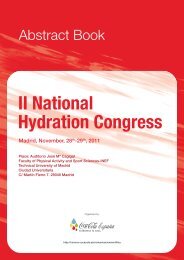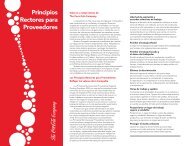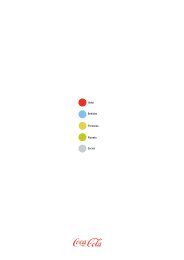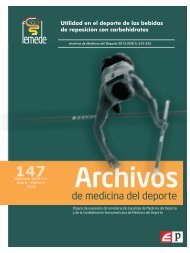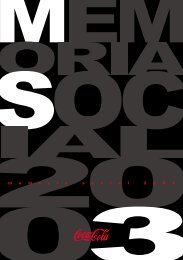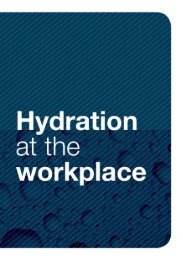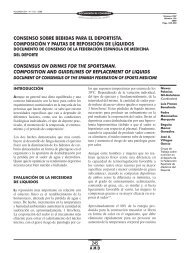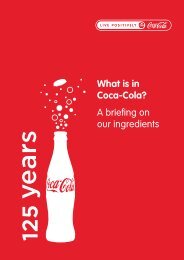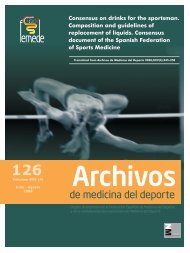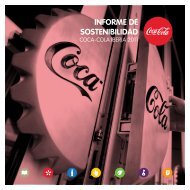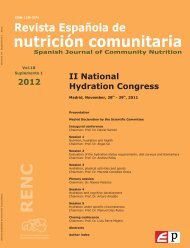athletes' medical information - Coca-Cola
athletes' medical information - Coca-Cola
athletes' medical information - Coca-Cola
You also want an ePaper? Increase the reach of your titles
YUMPU automatically turns print PDFs into web optimized ePapers that Google loves.
Supplements and<br />
sports foods<br />
athletes’ <strong>medical</strong> <strong>information</strong><br />
Athletes look to sports foods and nutritional<br />
supplements for many benefits, including:<br />
Promoting adaptations to training<br />
Increasing energy supply<br />
Allowing more consistent and intensive<br />
training by promoting recovery between<br />
training sessions<br />
Maintaining good health and reducing<br />
interruptions to training due to chronic<br />
fatigue, illness or injury<br />
Enhancing competitive performance.<br />
Providing a convenient source of nutrients<br />
that is easy to consume when everyday foods<br />
are unavailable or impractical to eat. This is<br />
most often the case just prior to, during or<br />
after an exercise session<br />
Sports foods are generally manufactured to<br />
achieve the last of these goals, and by<br />
providing a practical way to meet special<br />
nutrition needs they may indirectly assist<br />
the athlete to achieve some of the benefits<br />
on the list. Examples of useful sports foods<br />
include:<br />
Sports drinks (providing fluid and<br />
carbohydrate during exercise)<br />
Sports gels (additional carbohydrate intake,<br />
especially during exercise)<br />
Liquid meals (carbohydrate, protein, vitamins<br />
and minerals for a pre-event meal,<br />
post-exercise recovery or a high-energy diet)<br />
Sports bars (carbohydrate, protein, vitamins<br />
and minerals – often a solid form of the<br />
liquid meal)<br />
Of course, the cost of these sports foods<br />
must be taken into account when deciding to<br />
use them. Furthermore, the athlete should<br />
recognise that the sports food market includes<br />
products that are carefully manufactured to<br />
provide nutrients to meet well-documented<br />
goals right through to gimmicky items that have<br />
a poor composition or the addition of<br />
ingredients with a poor evidence base.<br />
The use of pills, potions, powders and other<br />
sports supplements is widespread among<br />
athletes but few products are supported by<br />
sound research and some may even be harmful<br />
to the athlete. Athletes should look carefully at<br />
the risks and rewards of individual supplements<br />
before trying them.<br />
Interactions with various medications need<br />
to also be considered. Athletes should work with<br />
their physician and dietitian to look closely at<br />
possible interactions.<br />
Where there is a demonstrated deficiency of<br />
an essential vitamin or mineral, and an<br />
increased intake from food is not possible, a<br />
supplement may be helpful. For example, other<br />
sections of this booklet have noted that athletes<br />
with a diagnosed deficiency of iron or Vitamin D<br />
may benefit from a course of supplements, but<br />
this should be done only if a blood test shows it<br />
to be necessary. The use of supplements,<br />
however, does not compensate for poor food<br />
choices and an inadequate diet. A much better<br />
option is to learn about nutrition and foods so<br />
that you can choose your foods to ensure that<br />
all your nutritional needs are met. A well-chosen<br />
diet will promote an adequate intake of all the<br />
essential vitamins and minerals.<br />
33<br />
12-113-COC_Paralymics_Booklet_20120718.indd 33<br />
7/18/12 4:29 PM



